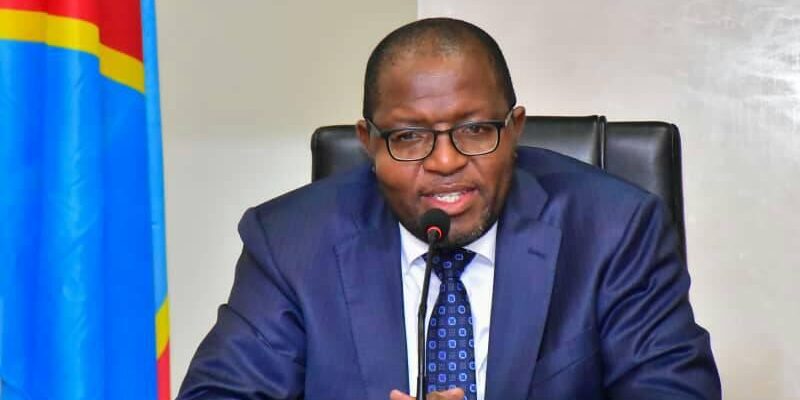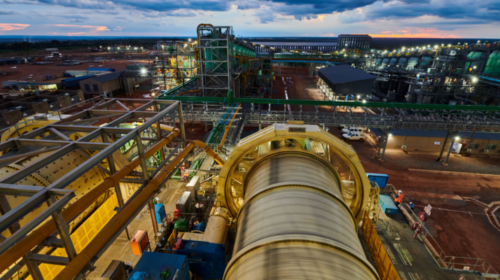DRC: Minister of Mines Willy Kitobo assigns himself 4 major actions in 2020
The Minister of Mines, Willy Kitobo, himself made his assessment of the actions carried out during the year 2020. Thus, he attributes four major achievements despite the covid-19 which marked this year: the maintenance of mining activities by strong measures despite the COVID19 pandemic; improving the business climate in the mining sector by maintaining a permanent dialogue between the Ministry and the major mining groups operating in the DRC and by popularizing the mining law; the fight against mining fraud and illicit activities in the mining sector and the strengthening of the regulation of artisanal mining activities of strategic mineral substances; or the revival of development activities in the mining sector.
Moreover, for the years to come, the Ministry of Mines intends to continue popularizing the Mining Code and signing certain implementing decrees and intensifying geological studies with financing from the Mining Fund.
Here are the four major actions of the Ministry of Mines to its credit in 2020, as described by Willy Kitobo in a document dated December 23, 2020.
- Maintaining mining activities through strong measures despite the COVID19 pandemic
COVID-19 has had a negative impact on the economies of every country in the world. And in March and April 2020, the Congolese economy experienced a brutal shock due to the closure of borders as a protective measure against COVID-19. The DRC mining sector was impacted and during these two months, revenue mobilization was poor. The reason was the drop in demand for metals on the world market which resulted in the drop in the prices of these metals.
By counting on a rapid resumption of the economic activities of the countries importing our merchant mining products and especially with the resumption at the end of April 2020 of the economic activities of China, the Ministry of Mines had taken strong measures authorizing the confinement of some of the workers on mining sites, facilitating the supply of mining inputs and the evacuation of merchantable mining products, supervision of the artisanal sector and the study of alternative ways of evacuating mining products in the event of border closures transit countries like Zambia and Tanzania. With these measures and the rise after June in metal prices, mining activities in the DRC were not strongly impacted.
On the other hand, the production of this year increased compared to that of the year 2019. In fact, the productions at the end of November 2020 of copper and cobalt metal were respectively 1,456,252.54 tonnes and 78,935.53 tonnes. The latter exceed those of 2019 which, at the same period, amounted to 1,295,131.65 tonnes of copper metal and 72,506.93 tonnes of cobalt metal.
- Improving the business climate in the mining sector by maintaining a permanent dialogue between the Ministry and the major mining groups working in the DRC and by popularizing the mining law .
The Mining Law promulgated on March 9, 2019 after the revision of certain provisions of the 2002 Mining Code found many difficulties on the ground for its application due to the lack of its popularization as recommended by the third edition of the DRC Mining Conference, the Company civil as well as technical and financial partners in the mining sector.
One of the important activities of the Ministry of Mines was therefore the popularization of the revised Mining Code to bring all the actors in the sector to the same understanding of the provisions of the law and mainly the modifications and innovations of the law. The second achievement is the improvement of the business climate in this sector by maintaining a permanent dialogue between the Ministry and the major mining groups operating in the DRC.
It was more this dialogue that helped enlighten the players in this sector on certain provisions that were subject to different interpretations. We can cite, among others, the problems of the mining Conventions which are no longer relevant, the notion of strategic substances, the Mining Fund for Future Generations, the clarification of article 220 of the Mining Code which gives the possibility to companies to access tax breaks, mining royalties from Decentralized Territorial Entities, payment of the portion of 0.3% of annual turnover for community development by mining companies, specifications or Responsibility Societal of Companies, etc.
- The fight against mining fraud and illicit activities in the mining sector and the strengthening of the regulation of artisanal mining activities of strategic mineral substances
Fraud and illicit activities are common practices in our country which are the basis of low mobilization of state revenue. The state of play of the sector has shown that mining fraud and illicit mining activities are more noted in the artisanal mining sector, and this fraud is the basis of the loss of our country’s credibility in the world. Indeed, artisanal mining suffers from several ills, including mining fraud, the lack of traceability of minerals, illegal and informal activities, the presence and child labor, lack of access to credit, lack of transparency and good governance, the issue of peaceful coexistence between artisanal workers and holders of mining rights,the invasion of mining areas covered by exclusive mining titles.
The strategy adopted by our Government to stem this scourge was to restructure the National Commission for the Fight against Mining Fraud, CNLFM in acronym, to strengthen regulations in the craft sector and to open our country to collaboration with technical and financial partners to improve the certification and traceability of mining products (Kimberley Process, Duty of Care of the OECD Guide, CTC Certification, ITRI Certification, etc.).
To strengthen the regulation of the artisanal exploitation of mineral substances declared strategic such as cobalt and coltan, the Ministry signed two important decrees: – Decree n ° 19/15 of November 5, 2019 on the Safeguarding of activities relating to strategic mineral substances artisanal mining; – Decree n ° 19/16 of November 05, 2019 on the Creation, organization and operation of the Authorization for the Regularization and Control of the Markets of strategic mineral substances of artisanal exploitation. The objective is to capture the revenue lost in fraud on this strategic metal by strengthening its traceability through a certification of minerals established by the Regulatory Authority, Market Control of strategic substances,but also to regulate the price of industrial cobalt and that from artisanal production.
It should be noted the important partnership agreement Ministry of Mines and Cobalt Action Partnership, CAP in acronym, which is in collaboration with the Global Battery Alliance, GBA in acronym, with participation of the Minister of Mines in the steering committee of CAP for facilitate the work of cleaning up responsible supply chains for cobalt in the DRC.
- The revival of development activities in the mining sector
To develop the mining sector, our government has focused on: – relaunching the activities of state portfolio companies in the mining sector; – the search for new deposits. Regarding the revival of companies in the State portfolio, note that each mining company, whether private or in the portfolio, must own mining assets which are deposits granted by the State in the form of mining titles, according to the Mining Law of March 9, 2018. The relaunch of activities on invalid assets would require the regularization and validation of titles with the Mining Cadastre. Any company, whether in the Portfolio or private, is required to comply with the prescriptions of the Mining Law. The other obligation, and not the least, concerns finances. For your information, when you read the current Mining Code,you will notice that even the granting of a permit is judged on the financial capacity of the Society. We cannot therefore speak of any revival of a mining company in the portfolio (which has gone bankrupt and has accumulated a lot of debts and social charges) without the mobilization of funds. This mobilization must be done, either by financing by the Public Treasury, or by the signature of joint-venture contracts.
It should be remembered that most of the contracts signed today by portfolio companies with private companies are approved by their general meetings without taking into account the real value of the deposits. Our Government has decided, in order to revive certain companies, to certify certain deposits under contract before revisiting them.
Regarding the search for new deposits, the Government has selected blocks of geological interest that it is currently studying by airborne methods with external partners such as X-Calibur and JOGMEC. This research will continue in depth in the field using FOMIN funding. It is the same for dormant deposits that the Government is gradually recovering from our companies in the State portfolio, like the Lweshe deposit that the Ministry intends to certify with the same funding before opening calls for offers for signing win-win contracts.
In addition, for the years to come, the Ministry of Mines intends to continue to popularize the Mining Code and the signing of certain implementing decrees such as: – the Interministerial Decree setting the practical modalities for the management and control of the quotas of the mining royalty paid to provinces and ETDs; – the Mining-Social Affairs Interministerial Decree setting the terms of management of the 0.3% share of annual turnover paid by mining companies to local communities.
Willy Kitobo also intends “to intensify geological studies with funding from FOMIN with the help of its National Geological Service of Congo”. Still with the support of FOMIN funding, the Ministry of Mines intends to strengthen the assistance of SAEMAPE services to encourage most of the Cooperatives to transform their ZEAs into Small Mines due to the depletion, in many sites, of surface minerals.
65 total views , 1 views today





